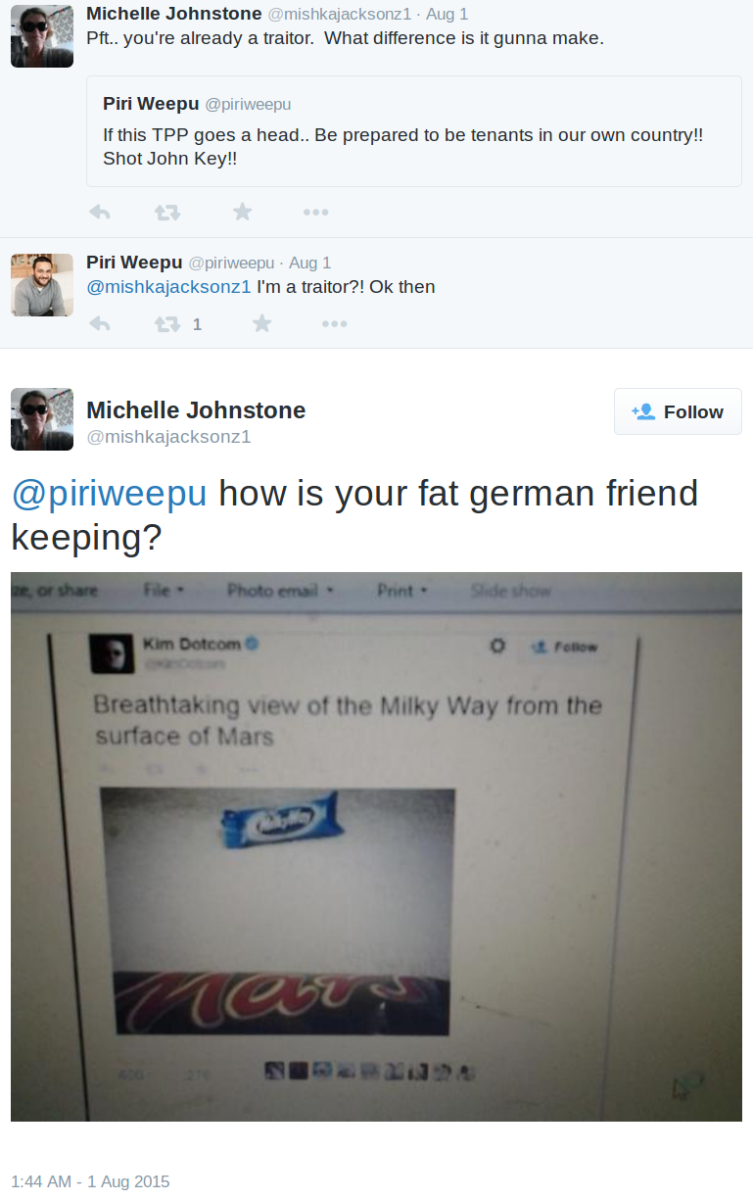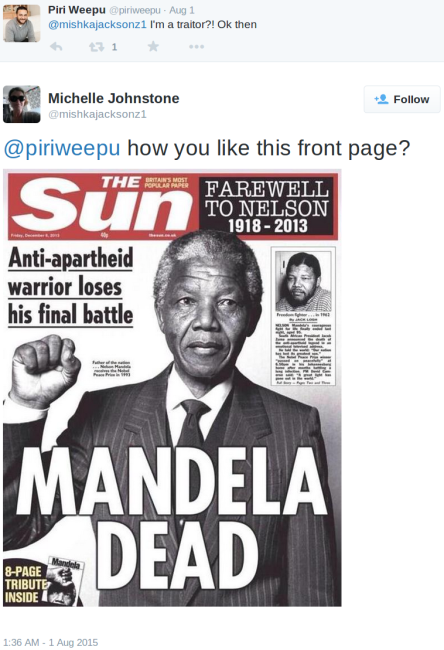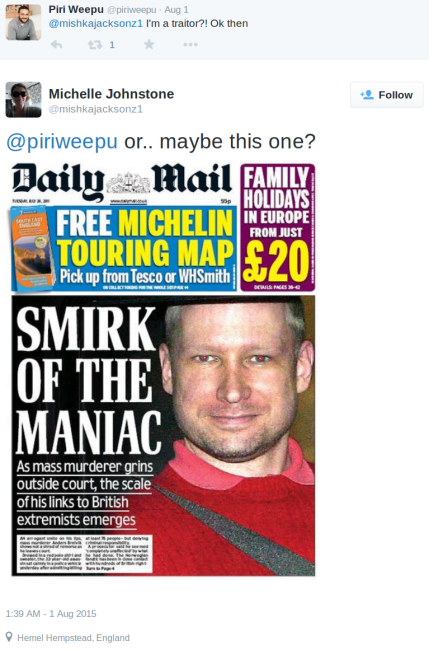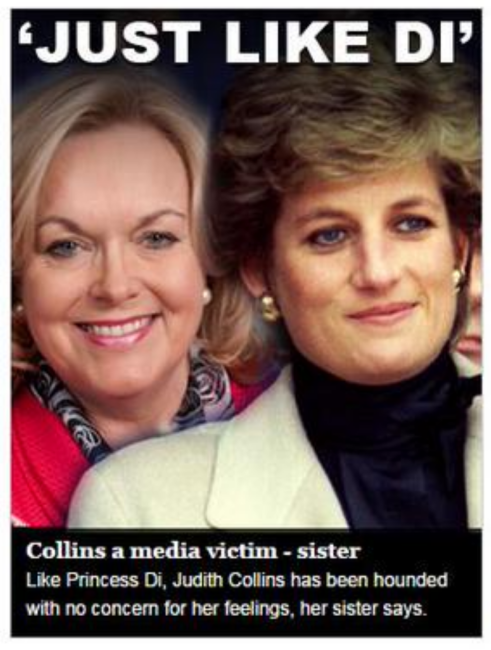The International Director of the Electronic Frontier Foundation, Danny O’Brien (@mala on Twitter) did a brilliant job of dissecting New Zealand’s recent passage of the ‘Harmful Digital Communications Bill’ (HDC) – known colloquially as the ‘Anti-Cyber Bullying’ or ‘Anti-Troll’ legislation.
However, while the ‘what’ of the issue has been extensively covered, there has been very little international attention on the abject irony of exactly who was behind the promotion of this bill, or how they pulled it off. Nor have the national media really been held to account over their effortless regurgitation of official narratives.
Martin Cocker, the Chief Executive of Netsafe, a government body expected to experience substantial growth as a result of the Bill passing, told the NZ Herald back in April of 2013 that “some countries had created new cyber-bullying offences but New Zealand was leading the world in constructing a formal process to support the law changes.”
While Kiwis are totally happy to lead the world in social progress and we often brag of doing so (for example; pioneering nuclear-free legislation; taking a stand against apartheid; becoming the first country in the world to allow women to vote; and requiring arbitration between employers and unions, by law), there is a wide chasm between the way the anti-Troll Bill is addressed in the media and the way it is viewed by civil liberties organisations and the public.
Tech Liberty New Zealand starkly warned: “we worry that the bill will be ineffectual where it might be needed most while being most effective where it’s most problematic to civil liberties”, continuing on to state “we’re quite sure that it includes a number of unreasonable restrictions on the right to freedom of expression.”
Unfortunately, any dissent or suspicion about the true intentions of the Bill were completely eclipsed by a slew of high profile media in support of it.
A major figure in the New Zealand mainstream sphere, Heather du Plessis-Allan, penned an opinion piece called “End of Days for Trolls”, lauding the Bill. Remarkably she failed to even name the Bill she was applauding let alone link to the actual text of the legislation.
Commenters were skeptical:

There was precisely two source links in du Plessis-Allan’s article. Both were videos; the showpiece was an unprecedented bi-partisan promotional effort that saw Judith Collins (from the ruling right-wing National government) appearing along with Jacinda Ardern (from the left-wing Labour opposition) amongst others, reading out “mean tweets” that their presentation infers would have been prevented by the Harmful Digital Communications Bill.
Astonishingly, the video has since been removed from YouTube for copyright violations. However, it can still be viewed here, courtesy of Stuff.co.nz.
Ultimately, only five Members of Parliament (out of 120) voted against the HDC – a landslide victory for its promoters.
A disproportionate representation given the concerns of the public, some of whom pointed out the elephant in the room:

Dictionary.com defines hypocrisy as “a pretense of having a virtuous character… that one really does not possess... a pretense of having some desirable or publicly approved attitude.” There is no more appropriate description for this recent development in the scandal-plagued landscape that the architect of the bill, Judith Collins, is smack in the middle of.
The ex-Minister of Police and Justice, who resigned in 2014 due to close ties with an “attack blogger” who was “mercilessly attacking opponents” is the same who in April 2013 had been promoting her anti-cyber bullying legislation.
According to the official government press release Ms. Collins said at the time “Our new anti-cyber bullying proposals protect victims and hold perpetrators to account. No one should ever be subject to this kind of cowardly attack.”
Yet acclaimed Kiwi investigative journalist Nicky Hager’s 2014 tome ‘Dirty Politics‘ detailed countless cowardly attacks and co-ordinated cyber-bullying campaigns in which Ms Collins was positioned as a major player. So much so that there is an entire chapter of the book written about her.
Dirty Politics: Politicians Covertly Involved in Cyber-Bullying
In leaked emails, text and instant messages between attack blogger Cameron “WhaleOil” Slater and National Party stalwarts, the innermost mechanics of the New Zealand right-wing’s own habitual leaking and media manipulations, smear campaigns and electioneering was dramatically exposed.
Summarizing his investigation into her involvement, Nicky Hager writes:
This chapter raises a number of concerns about Collins: she was apparently unworried about the leak of police evidence; she was directly involved in providing information about and attacking a Ministerial Services staff member; she disclosed confidential departmental and client information… she made it her business to feed a stream of information, gossip and documents for use on the Whale Oil site. She was also a close friend and trusted confidante of Cameron Slater, which says much about her as a politician – ‘Dirty Politics’, by Nicky Hager
But even that summary is mild by comparison to Collins’ own words, as cited in the book.
She uses disparaging pet names to reference fellow politicians – calling Labour MP’s Clayton Cosgrove “Plughead“; Stuart Nash “Mangrove“; Carmel Sepuloni “Septic Tank“, and most astonishingly of all, she refers to Jacinda Ardern as “My Little Pony“.
That is the same Jacinda Ardern that appears alongside Collins in the bi-partisan promotional video for the Harmful Digital Communications Bill.
“You should whack these guys hard” Collins is quoted as telling the attack blogger, about his victims.
Hager explains:
They called it the double rule. If someone attacked them, they gave back twice as much. Here is Slater writing about a senior National Party official who had annoyed him:
Cameron Slater: “…now he is going to get double.”
Judith Collins: “you know the rule, always reward with Double.”
Cameron Slater: “i learned the rule from you! Double it is.”
Judith Collins: “If you can’t be loved, then best to be feared.”
Indeed, even in the promotional video the politicians can’t resist dishing criticism back at their detractors.
“Pot, kettle, black” says Judith Collins to one tweeter.
“Another bald-headed man’s jealousy” says United Future’s Peter Dunne, who has the dubious distinction of being yet another Minister who once resigned in the middle of a major scandal, only to then cast the deciding vote for the passage of the extremely contentious GCSB Bill – legislation that retrospectively legalized New Zealand’s international spy agency turning their attentions on their own domestic citizenry.
“You must be a real dope” Dunne tells another tweeter, who had referenced having had a day-time nap.
Judith Collins herself seems completely oblivious to the hypocrisy of the promotional video, or her own back in November of 2013, as Stuff reports: ‘Asked if Labour is backing the Harmful Digital Communications Bill, Collins said “only a moron” wouldn’t give support’
Capitalizing on Gang Rape: The Roastbusters Connection
The list of twitter accounts singled out for sending ‘mean tweets’ in the promotional video is really telling. It includes the accounts of some very visible left-wing activists as well as several that are clearly parody accounts, which should traditionally not be considered “harmful communications” at all.
But most noteworthy is the account to which Peter Dunne directed his “bald-headed man” retort – that of @egorub, real name David, who was a prominent organizer of an anti-Roastbusters action I filmed in 2014, which was a response to revelations that New Zealand police had failed to charge a group of serial pack rapists of underage girls.
This is the video I shot of the not-bald David very poignantly speaking out:
The Roastbusters perpetrators had familial ties to a police officer and a local celebrity, and despite the fact that over 30 victims were identified, no charges were laid.
The same Law Commission who authored the Issues Paper, performed Ministerial Briefings and wrote a Report and Terms of Reference for what ultimately became the anti-Troll legislation, had also been working on solutions to the Roastbusters debacle.
According to Green Party MP Jan Logie “former Justice Minister Judith Collins had halted Law Commission work on processes for sexual violence cases and National had not gone ahead with a proposal for victims’ advisors.”
The Stuff.co.nz article linked to earlier sheds further light on this, stating:
Collins did not want to be drawn on the Roast Busters case while it was subject to a police investigation. However, she did defend shelving proposals by predecessor Simon Power to introduce an inquisitorial trial system for sex offenses. She dumped the idea last year, saying it was too tricky to impose a different system for certain crimes. “I think it is always difficult, whether it is a woman or a man who has been subject to some form of sexual activity, to come forward and to say that they want to make a complaint,” she admitted. “To make it easier would also make it much harder for someone to defend themselves if they are accused of sexual violation.
Why is this relevant? Because the Roastbusters scandal has been consistently referenced by media as a justification for the passage of the anti-Troll legislation.
This 30 June 2015 NZ Herald article describes the legislation as “wide-reaching” and continues:
The legislation was drafted after the so-called Roast Busters case, in which teenage boys boasted on-line about sex with drunk and under-age girls.
But it wasn’t at all.
It was drafted in April of 2013 and the Roastbusters scandal did not emerge until November 2013.
Later in the article, a dissenting opinion confirms this:
…the Independent Police Conduct Authority had examined the Roast Busters case and found that it could have been dealt with under existing law.
This was a vindication of the position of journalist and lawyer Catriona McLennan, who I also interviewed at the aforementioned anti-Roastbusters action.
After police claimed they had no provision under which to act independently she scoured the law books and unearthed the following information which she included in her speech:
The police don’t need a statement from a complainant to lay charges. At the start, the police put the onus on the victims by saying none of them had been “brave enough” to come forward. Not only was that not true. It’s not necessary in law. Other types of evidence can be used – in all that was posted by the boys on social media about what they did, was there not anything that could be used as evidence for a single charge ?
Here’s some charges that might apply
Section 128 Crimes Act 1961 – sexual violation
Section 134 Crimes Act 1961 – sexual conduct with young person under 16
Section 135 Crimes Act 1961 – indecent assault
Section 194 Crimes Act 1961 – assault on a child
Section 197 Crimes Act 1961 – disabling (stupefying)
Section 208 Crimes Act 1961 – detention without consent with intent to have sexual connection
Section 216G – making an intimate visual recording (if pictures were taken)
Section 160 Sale of Liquor Act 1989 – purchasing or acquiring liquor with the intention of supplying it to a person under 18.
Despite this, the Roastbusters scandal was used as direct and deliberate justification for the passage of the anti-Troll bill over and over and over and over and over and over again.
From official Parliament websites and press releases, to the National Party website, to a slew of media and NGO websites, the Roastbusters scandal was referenced time and time again as being the catalyst for the bill.
Making it clear that not only was justice not served for the countless victims of the Roastbusters rape crew; not only were Law Commission recommendations in relation to the case directly blocked by the very author of the Harmful Digital Communications Bill; but the scandal itself was then used as a convenient P.R. manouevre to use public empathy for the victims to push the anti-Troll legislation through, co-opting victims’ pain and degradation for political gain while smoothing over the Police’s failure to act on the many legitimate complaints.
Major New Zealand Sports Star Receives Death Threats: HDC Bill Won’t Help
Many New Zealanders are currently celebrating the political courage of infamous All Black Piri Weepu (@PiriWeepu on Twitter). All members of the All Blacks are considered national heros by default but Piri Weepu particularly so.
Lamely trying to come up with an international equivalent, he is a David Beckham or a Tom Brady figure – but without the risqué advertising campaigns and supermodel girlfriends. He is instead a much revered and humble family man, and recently he has been making no bones about his opposition to the TPP.
In a series of tweets directly calling out John Key’s National government and their stance on the globally despised trade agreement, which seeks to supersede the sovereignty of entire countries, subjecting them to corporate tribunals that claim jurisdiction above local laws, Piri has gained himself many new supporters amongst the 90+% of New Zealanders that oppose the Trade Bill, but picked up some very nasty detractors.
One of which has been sending him, ostensibly from Hampstead, England, what can only be interpreted as hate speech and death threats.
The troll starts out calling Piri a traitor then accuses him of being friends with Kim Dotcom.
(When reading the thread please bear in mind that Piri’s sarcastic use of the word “Shot” has nothing at all to do with shooting anyone but is a Kiwi colloquial term that means “thanks a lot!” or in this case “no thanks at all!”)

Piri is New Zealand Maori (of indigenous descent) so the troll escalates things by sending him a screenshot of front-page news of Nelson Mandela’s death, who was, of course, another indigenous celebrity who stood for his people against governmental oppression.

Even though by this point Piri rightly stops replying, the troll continues the harassment, sending Piri pics of Phar Lap (a dead celebrity horse), one referencing the death of Dodi al-Fayed with mention of him having given Princess Diana a ring on the day of their death (on his Twitter time line, Piri had recently congratulated a couple who were getting married) and then for good measure tweets him this photo of a “mass murderer”.

To top it all off – the piece de resistance – a photo of none other than Judith Collins, architect of the Harmful Digital Communications Bill. The above is the trademark behavior of a state-sponsored JTRIG-style troll account.
The above is the trademark behavior of a state-sponsored JTRIG-style troll account.
No amount of complaints or inquiries will ever unmask its true owner; they will never be prosecuted under Collins’ Bill, and never be held accountable.
Because the truth is that state spy agencies recruit and train operatives to undertake exactly this type of mission – to run psy-ops on and intimidate political dissidents – even if, or especially if, they are major celebrities.
The Dream of the Free and Open Internet is Dying
As reluctant as I am to end on a somber note, perhaps it’s time we listened to the experts, rather than the mainstream’s regurgitation of government spin.
This week at the BlackHat 2015 infosec conference in Las Vegas, the director of Civil Liberties at the Stanford Center for Internet and Society, Jennifer Granick, was quoted as saying that “the dream of the free and open Internet is slowly being killed by over-regulation, censorship and bad laws that don’t stop the right people“.
Maybe that is because the wrong people have been making the laws and crucifying the right people in order to pass them.
Written by Suzie Dawson
Twitter: @Suzi3D
Official Website: Suzi3d.com
Journalists who write truth pay a high price to do so. If you respect and value this work, please consider supporting Suzie’s efforts via credit card or Bitcoin donation at this link. Thank you!